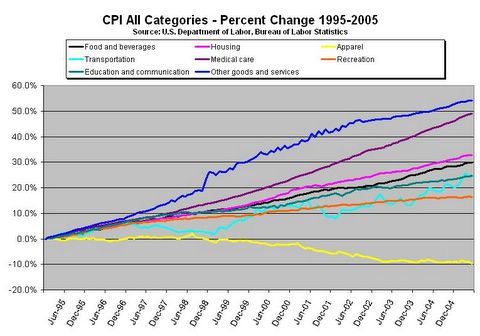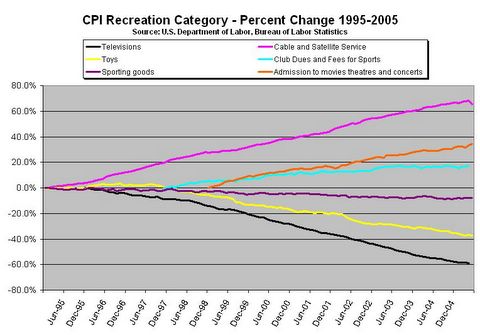Tin Foil Hats at Forbes.com
Friday, July 29, 2005
Well, well, well ...
Someone in the mainstream financial media has finally stumbled across the obvious answer to the question of how China can avoid duplicating some of the mistakes that Japan made with their bulging U.S. dollar reserves back in the late 1980s. Over at Forbes.com we find this illuminating article by about the possibility of China acquiring gold bullion with some portion of those U.S. dollars that keep piling up in their central bank.
It seems that instead of being enamored with U.S. entertainment and recreation businesses as the Japanese were (e.g., Rockefeller Center and Pebble Beach), the Chinese are much more practical. (Maybe this practicality has something to do with the unusually high number of engineers, and unusually low number of lawyers, in the Chinese government - not sure where we heard this, but we believe it to be true. It seems to make sense. If it's not true, then it was fun believing it for a while.)
Having recently grown a bit tired of purchasing U.S. Treasuries month after month, the Chinese now seem more inclined to spend those U.S. dollars on mining companies, oil companies, and other natural resource companies to help ensure the steady flow of raw materials needed for their manufacturing juggernaut.
But, with the resistance to the Unocal bid, and sure opposition to similar bids for U.S. companies in the future, Mr. writes:"How then can China reduce its subordination to U.S. interests and use its dollar reserves to strengthen its role in world affairs?
Isn't that delicious? China, the emerging economy of the 21st century tires of the U.S. dollar IOUs piling up in its banks, and decides to take a goodly portion of these dollars and buy gold. The "barbarous relic", as Keynes called it, resurfaces as a store of value in an emerging economy, as the aging empire attempts to sustain it's position as sole economic superpower by creating more and more fiat money.
I believe China will eventually find gold as a partial solution to its foreign-exchange problem. While an immediate reaction may be to think this is nonsense, a closer examination may provide some food for thought. Gold was the world reserve standard for centuries until former President Richard Nixon closed the "gold window" on Aug. 15, 1971. What he did, in effect, was end the exchangeability of gold for dollars at the fixed rate of $35 per ounce ... The change was necessitated by the fact that foreign holdings of dollars had gotten well beyond the U.S. reserves for gold ... When America abandoned gold, no one was inclined to step in and continue the gold standard. And since gold earned no interest, nations around the world began to systematically reduce or eliminate their gold holdings. Time has shown that such gold holdings would, through subsequent appreciation, have served quite well as an alternative to U.S. Treasurys. However, in today’s world of multibillion-dollar reserves, the gold market is too illiquid to serve its former role.
To revive gold’s role as a reserve currency, it again would need a sponsor—a buyer and seller of last resort who dictated the support price. That price could increase each year, per government policy, by a set amount. China, with its $700 billion in reserves has the clout to assume this role."
According to the World Gold Council, Asian countries hold a disproportionately small amount of gold as reserves - only 6% of all central bank gold is in Asian banks. It is the Europeans and the U.S who hold more than two-thirds of the central bank gold which accounts for roughly 20% of all above ground gold. If you listen to European and U.S. central bankers, you'd wonder why they hold any gold at all, given their obvious mastery over paper money.
How long European and U.S. mastery over paper money can continue is likely a question that Chinese government officials ask themselves often.
Mr. goes on to say: "Holding large gold reserves can serve China’s domestic economic policy, as well ... Gold has a long history with individual Chinese as a way to hide and preserve wealth...
It is ironic isn't it? In China and India, workers sweat and toil, then at the end of the day ride their bicycles to their tiny homes, looking forward to their next paycheck so they can convert some more hard earned local currency into gold - what they believe is a store of value.
The ultimate attraction of such a policy for China is that it allows them to reduce their vulnerability to the United States. Even more so, it allows them to play a dominant role in international affairs, clearly a high priority with current Chinese leadership.
While it is not in the U.S. interest to strengthen China’s role in world affairs, it is a better alternative than letting pressures build inside China’s government over a perceived, if not actual, threat to their sovereignty. Also, other solutions to the dollar reserve problem may be dreamed up that prove to be far more dangerous to the current international order. Forecasts are for China’s reserves to grow to $1 trillion dollars by June 2006. Such an accumulation only puts more pressure on the Chinese to find an alternative solution."
In this country, workers sweat and toil, then at the end of the day drive home in their gas guzzling SUVs to their oversized homes, looking forward to their next paycheck, hoping they can make ends meet at the end of the month - all the while going deeper and deeper into debt.
So, will the Chinese start buying gold in a big way?
Put yourself in their position - if you are a bartender and all you have to show from the patronage of your best customer is IOUs, which have been piling up behind the counter for years now and show no signs of stopping, wouldn't you try to prevent the pile from rising any higher?
Wouldn't you try to exchange some of these IOUs for something more tangible?
[By the way, the tin foil hat reference in the title is something that we learned from Barry Ritholtz over at The Big Picture. Apparently gold bugs wear them. They may be all the rage in a few years.]






